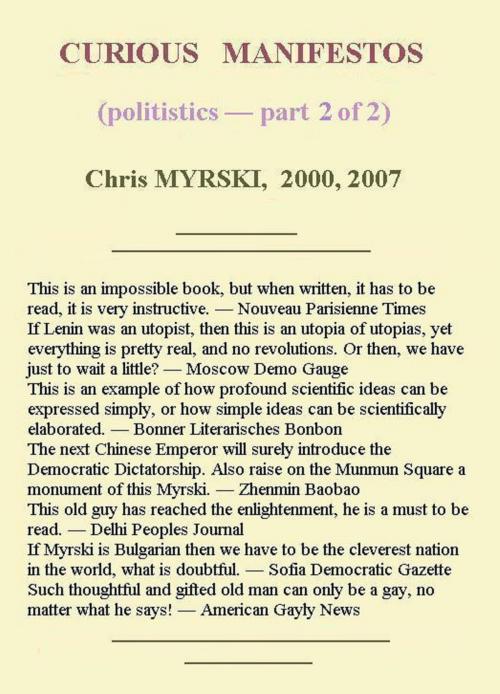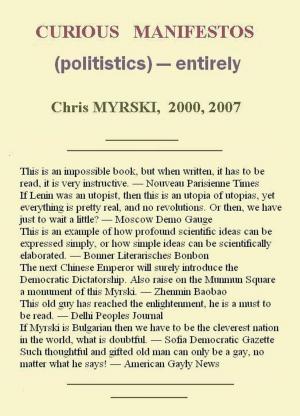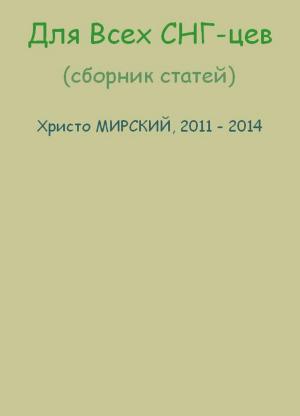Curious Manifestos (Politistics) — Part Two
Nonfiction, Social & Cultural Studies, Political Science, Government, Public Policy| Author: | Chris Myrski | ISBN: | 9781370369102 |
| Publisher: | Chris Myrski | Publication: | July 11, 2017 |
| Imprint: | Smashwords Edition | Language: | English |
| Author: | Chris Myrski |
| ISBN: | 9781370369102 |
| Publisher: | Chris Myrski |
| Publication: | July 11, 2017 |
| Imprint: | Smashwords Edition |
| Language: | English |
The proposed book is collection of papers of genre called, according to the author's definition, “/politistics/”, which comprises all what can be said about the social policy — either a theoretical or scientific investigation, a documentary material, a satire, a pamphlet, some fiction etc, or any kind of mixture of the mentioned, as much as life itself is, in general, mixture off any, good and bad, things. To define is to delimit, as some people know, and that is the etymology of the word (meaning to make it finite, to set some limits) and, in this sense, some not strictly defined writing genre should not lose, but on the contrary may enhance, the reader's interest in a similar way as a good coffee blend, for example, has better taste than any one of the used sorts.
The Manifestos presented in the book are too serious to be read in bed at night, but also too paradoxical to be seriously taken by the reader. But what are the paradoxes if not something that is placed outside of our knowledge and parallel to it, because this word comes directly from Greek παραδοξοσ, meaning something unbelievable, contradicting to well accepted notions (usually because our knowledge is not sufficient to comprise them, too), and which is build from παρα + δοξα where the first means “around” and the second is a thesis, statement. They are as if parodies of the Marxian Manifesto (judging by the beginning of each of them), but this is only small formal similarity and in their core they are rather parodies of /all/ democratic parties, i.e. of the (multi-) party system, and therefore they criticize, respectively, the politics and politicians on the whole, the democracy, as well as the simplicity and vulgarity of the people (who in Latin are unavoidably vulgar). For one thing, they are very logical, if one reads them carefully, but for another — they are just Utopias. At the same time, however, some materials are highly ironical and instructive for those who are capable to find pleasure in things interesting from the so called /speculative/ point of view, i.e. as knowledge in itself and not because it is useful in their everyday life.
One may take the Manifestos for political science fiction of a kind (in which there is more science and logic and less fiction as is usually accepted), or as popular treatise about democracy (something that in no way is superfluous in countries with insufficient experience in the area), or simply as political pamphlets (because is preserved the main element of the manner of speech of a politician, namely: to speak only /pro/ his part and /contra/ the opposite one). To some of them there are Addendums where is schematized the mathematical model of the proposed idea, which are very serious, but they may be skipped, if you find them difficult to read. Another ones are really comic, but this does not make them entirely inapplicable, if a reasonable approach will be applied. The common joining idea is that each one of them proposes some ideal (in a given aspect) model of democracy, which is /better than each/ of the existing democratic forms, what, for its part, gives right to some of the readers to name the book antidemocratic (just that the “anti” is related with our naive and euphoric notions about the contemporary democratic forms, and not with the very democratic idea).
Here the book is divided in two parts and below are the names of the parties / movements (which in Bulgarian original have abbreviations with 3 /equal/ letters) from the second part: FCP (Forever Changing Party) with Addendum to it, BRD (Believers in the Reasonable Difference) with Addendum to it, USC (Union for Strength and Competition), TTT (Tandem for Total Totalization), FFF (Feminism Forcing Formation), and CCC (Civilized Centralization and Circuses) with Addendum to it, plus some aphorisms in the Afterword, and “Hurray, Is It Possible (Government of the Reasonable Alternative)? ” as Supplement:
The volumes of the parts are: 182,000 & 211,000 chars.
The proposed book is collection of papers of genre called, according to the author's definition, “/politistics/”, which comprises all what can be said about the social policy — either a theoretical or scientific investigation, a documentary material, a satire, a pamphlet, some fiction etc, or any kind of mixture of the mentioned, as much as life itself is, in general, mixture off any, good and bad, things. To define is to delimit, as some people know, and that is the etymology of the word (meaning to make it finite, to set some limits) and, in this sense, some not strictly defined writing genre should not lose, but on the contrary may enhance, the reader's interest in a similar way as a good coffee blend, for example, has better taste than any one of the used sorts.
The Manifestos presented in the book are too serious to be read in bed at night, but also too paradoxical to be seriously taken by the reader. But what are the paradoxes if not something that is placed outside of our knowledge and parallel to it, because this word comes directly from Greek παραδοξοσ, meaning something unbelievable, contradicting to well accepted notions (usually because our knowledge is not sufficient to comprise them, too), and which is build from παρα + δοξα where the first means “around” and the second is a thesis, statement. They are as if parodies of the Marxian Manifesto (judging by the beginning of each of them), but this is only small formal similarity and in their core they are rather parodies of /all/ democratic parties, i.e. of the (multi-) party system, and therefore they criticize, respectively, the politics and politicians on the whole, the democracy, as well as the simplicity and vulgarity of the people (who in Latin are unavoidably vulgar). For one thing, they are very logical, if one reads them carefully, but for another — they are just Utopias. At the same time, however, some materials are highly ironical and instructive for those who are capable to find pleasure in things interesting from the so called /speculative/ point of view, i.e. as knowledge in itself and not because it is useful in their everyday life.
One may take the Manifestos for political science fiction of a kind (in which there is more science and logic and less fiction as is usually accepted), or as popular treatise about democracy (something that in no way is superfluous in countries with insufficient experience in the area), or simply as political pamphlets (because is preserved the main element of the manner of speech of a politician, namely: to speak only /pro/ his part and /contra/ the opposite one). To some of them there are Addendums where is schematized the mathematical model of the proposed idea, which are very serious, but they may be skipped, if you find them difficult to read. Another ones are really comic, but this does not make them entirely inapplicable, if a reasonable approach will be applied. The common joining idea is that each one of them proposes some ideal (in a given aspect) model of democracy, which is /better than each/ of the existing democratic forms, what, for its part, gives right to some of the readers to name the book antidemocratic (just that the “anti” is related with our naive and euphoric notions about the contemporary democratic forms, and not with the very democratic idea).
Here the book is divided in two parts and below are the names of the parties / movements (which in Bulgarian original have abbreviations with 3 /equal/ letters) from the second part: FCP (Forever Changing Party) with Addendum to it, BRD (Believers in the Reasonable Difference) with Addendum to it, USC (Union for Strength and Competition), TTT (Tandem for Total Totalization), FFF (Feminism Forcing Formation), and CCC (Civilized Centralization and Circuses) with Addendum to it, plus some aphorisms in the Afterword, and “Hurray, Is It Possible (Government of the Reasonable Alternative)? ” as Supplement:
The volumes of the parts are: 182,000 & 211,000 chars.















